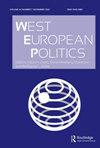Quiet unity: salience, politicisation and togetherness in the EU’s Brexit negotiating position
IF 3.6
1区 社会学
Q1 POLITICAL SCIENCE
引用次数: 0
Abstract
A surprising feature of Brexit has been the united front the EU-27 presented during post-referendum negotiations. This membership crisis arrived when the EU had been facing multiple overlapping political and economic crises revealing deep cleavages both between and within member states. How did negotiations prevent a widening politicisation of European integration? In this article a novel dataset is used, containing national and European newspaper Brexit coverage between 2016 and 2020 to establish how negotiating stances were formed in key EU institutions and five influential member states: Ireland, Spain, France, Germany and Poland. The results indicate that the European Commission could maintain a strong, centralised negotiating position over Brexit because the preferences of these member states were mutually inclusive, their negotiating stances aligned, and each national case was subject to generally low levels of domestic politicisation. As a result, while Brexit shocked the EU, its immediate fallout could be contained even during uncertain times.安静的团结:欧盟脱欧谈判立场的突出性、政治化和团结性
英国脱欧的一个令人惊讶的特点是,欧盟27国在公投后的谈判中表现出了统一战线。当欧盟面临多重重叠的政治和经济危机时,成员国之间和内部都出现了深刻的分歧。谈判是如何阻止欧洲一体化日益扩大的政治化?本文使用了一个新颖的数据集,其中包含2016年至2020年期间国家和欧洲报纸对英国脱欧的报道,以确定欧盟主要机构和五个有影响力的成员国(爱尔兰、西班牙、法国、德国和波兰)的谈判立场是如何形成的。结果表明,欧盟委员会可以在英国退欧问题上保持强有力的集中谈判立场,因为这些成员国的偏好是相互包容的,它们的谈判立场是一致的,而且每个国家的情况都受到国内政治化程度普遍较低的影响。因此,尽管英国脱欧震惊了欧盟,但即使在不确定时期,其直接影响也可以得到控制。
本文章由计算机程序翻译,如有差异,请以英文原文为准。
求助全文
约1分钟内获得全文
求助全文
来源期刊

West European Politics
POLITICAL SCIENCE-
CiteScore
10.00
自引率
7.10%
发文量
58
期刊介绍:
West European Politics (WEP)has established itself as one of the most authoritative journals covering political and social issues in Western Europe. It has a substantial reviews section and coverage of all national elections in Western Europe. Its comprehensive scope, embracing all the major political and social developments in all West European countries, including the European Union, makes it essential reading for both political practitioners and academics.
 求助内容:
求助内容: 应助结果提醒方式:
应助结果提醒方式:


